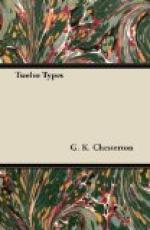Matters are very different with the more modern school of doubt and lamentation. The last movement of pessimism is perhaps expressed in Mr Aubrey Beardsley’s allegorical designs. Here we have to deal with a pessimism which tends naturally not towards the oldest elements of the cosmos, but towards the last and most fantastic fripperies of artificial life. Byronism tended towards the desert; the new pessimism towards the restaurant. Byronism was a revolt against artificiality; the new pessimism is a revolt in its favour. The Byronic young man had an affectation of sincerity; the decadent, going a step deeper into the avenues of the unreal, has positively an affectation of affectation. And it is by their fopperies and their frivolities that we know that their sinister philosophy is sincere; in their lights and garlands and ribbons we read their indwelling despair. It was so, indeed, with Byron himself; his really bitter moments were his frivolous moments. He went on year after year calling down fire upon mankind, summoning the deluge and the destructive sea and all the ultimate energies of nature to sweep away the cities of the spawn of man. But through all this his sub-conscious mind was not that of a despairer; on the contrary, there is something of a kind of lawless faith in thus parleying with such immense and immemorial brutalities. It was not until the time in which he wrote ’Don Juan’ that he really lost this inward warmth and geniality, and a sudden shout of hilarious laughter announced to the world that Lord Byron had really become a pessimist.
One of the best tests in the world of what a poet really means is his metre. He may be a hypocrite in his metaphysics, but he cannot be a hypocrite in his prosody. And all the time that Byron’s language is of horror and emptiness, his metre is a bounding ‘pas de quatre.’ He may arraign existence on the most deadly charges, he may condemn it with the most desolating verdict, but he cannot alter the fact that on some walk in a spring morning when all the limbs are swinging and all the blood alive in the body, the lips may be caught repeating:
’Oh, there’s not
a joy the world can give like that it takes away,
When the glow of early youth
declines in beauty’s dull decay;
’Tis not upon the cheek
of youth the blush that fades so fast,
But the tender bloom of heart
is gone ere youth itself be past.’
That automatic recitation is the answer to the whole pessimism of Byron.
The truth is that Byron was one of a class who may be called the unconscious optimists, who are very often, indeed, the most uncompromising conscious pessimists, because the exuberance of their nature demands for an adversary a dragon as big as the world. But the whole of his essential and unconscious being was spirited and confident, and that unconscious being, long disguised and buried under emotional artifices, suddenly sprang into prominence in the face of a cold, hard, political necessity. In Greece he heard the cry of reality, and at the time that he was dying, he began to live. He heard suddenly the call of that buried and sub-conscious happiness which is in all of us, and which may emerge suddenly at the sight of the grass of a meadow or the spears of the enemy.




